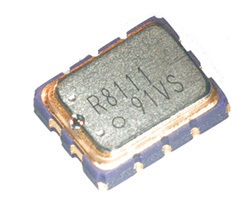Epson Develops Compact, Real-Time Clock Modules with a Time-Stamp Function
- Ideal for wide range of products that need clock functions, from small electronics to factory automation equipment -

- TOKYO, Japan, October 1, 2019 -
Seiko Epson Corporation (TSE: 6724, "Epson") has added two new real-time clock (RTC) modules*1 to its lineup: the RX8111CE and RX4111CE. Both come in a tiny 3.2 x 2.5 x 1.0 mm package and are equipped with a time-stamp function. Epson will begin shipping samples of the RX8111CE in November 2019 and the RX4111CE in December 2019. Epson expects to commence volume production in March 2020.
Epson's RTC modules are widely used in equipment that needs time of day information to be logged and stored. In recent years, electronic equipment has continued a trend of integration while realizing a reduction in their physical and environmental footprints. The need for RTC modules that consume less current and maintain accurate time over a wider temperature range has grown in kind.
Like their predecessor, Epson's RX8130CE, the new RTC modules are small, have a built-in frequency-adjusted 32.768 kHz crystal unit, and an automatic battery switchover function. However, the new modules are also equipped with a time-stamp function that logs and stores time information. The function can be used, for example, to record the time of system software updates, battery replacements, and system alerts. Time-stamps are stored even when power is switched over to the alternative battery source, contributing to system robustness. The new modules consume 100nA, a 67% improvement from their predecessor. This significant reduction in current consumption makes it possible to use a smaller, cheaper secondary battery or capacitor. In addition, Epson has also expanded the interface options by offering an SPI-Bus interface in addition to an I2C-Bus*2 interface.
*1: A real-time clock module is a single-package product that has a real-time clock IC with clock, calendar, and
other functions and an integrated 32,768-kHz crystal unit. These modules not only benefit users by eliminating the need to design oscillator circuits and adjust clock accuracy, their small size and level of integration also
allow customers to use their board space more efficiently.
*2: I2C-Bus is a trademark of NXP Semiconductors.
Applications
The new RTC modules are ideal for use in products such as factory automation equipment, office equipment, hand-held terminals, security equipment, and other small electronic products.
Notes and Definitions
Please see the link below for further details.
RX8111CE
https://www5.epsondevice.com/en/products/rtc/rx8111ce.html
RX4111CE
https://www5.epsondevice.com/en/products/rtc/rx4111ce.html
Product specifications
| Model No. | RX8111CE | RX4111CE |
|---|---|---|
| Interface | I2C-Bus | SPI-Bus |
| Interface voltage range | 1.6V to 5.5V | |
| Time-keeping (hold) voltage range | 1.1V to 5.5V | |
| Current consumption at backup | 100 nA (Typ.) @ 3V | |
| Frequency deviation | B: 5 ± 23 x 10-6 (equivalent to a monthly rate of ±1 minute) A: 5 ± 11.5 x 10-6 (equivalent to a monthly rate of ±30 seconds) * Conditions: Temperature 25°C, VDD = 3.0 V |
|
| Functions | Built-in power switching circuit Time stamp: Records from 1/256 sec. to year digits Max. 8 times Wake-up timer: 244.14 μs to 32 years |
|
| Dimensions | 3.2 x 2.5 x 1.0 t mm (Max.) | |
About Epson
Epson is a global technology leader dedicated to becoming indispensable to society by connecting people, things and information with its original efficient, compact and precision technologies. The company is focused on driving innovations and exceeding customer expectations in inkjet, visual communications, wearables and robotics. Epson is proud of its contributions to realizing a sustainable society and its ongoing efforts to realizing the United Nations' Sustainable Development Goals.
Led by the Japan-based Seiko Epson Corporation, the worldwide Epson Group generates annual sales of more than US$10 billion.
corporate.epson/en/



